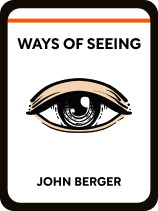

This article is an excerpt from the Shortform book guide to "Ways of Seeing" by John Berger. Shortform has the world's best summaries and analyses of books you should be reading.
Like this article? Sign up for a free trial here .
What is the purpose of marketing? What does it accomplish? Whom does it serve?
According to John Berger, the author of Ways of Seeing, the purpose of marketing is to keep the machines of capitalism moving: to keep the rich rich and the poor poor. It is accomplished by evoking envy and giving a promise of a better life.
Continue reading to learn more about Berger’s view.
What Does Marketing Promise?
What is the purpose of marketing?
Every advertisement you see offers a different product or service, but Berger explains that they all promise the same thing: An improved life. By spending money on this or that, your life will become more fun, more relaxing, more convenient. You will improve as a person. Others will envy you and emulate you.
(Shortform note: The examples that Berger uses almost entirely focus on the promise of being envied. Today, marketing tends to focus more on offering convenience. We can infer that the demands of the time dictate what is being promised to the consumer.)
Marketing and Reproduction
Most advertisements don’t explicitly display fine art, but when they do, Berger points out that they use all of the techniques discussed in the chapter on reproduction: Separation of art from its original home, breaking of the whole into parts, as well as proximity to words and other images. Consider the following examples:
In this medicine advertisement by Pfizer, Van Gogh’s Self Portrait is manipulated to imply that had he taken this medicine, his schizophrenia would be under control and he wouldn’t have cut his own ear off. Note the smile they placed upon Van Gogh’s face in addition to the removal of the ear bandages. The manipulation is possible not only by the image, but because of the proximity to the words “For Schizophrenia” and the image of a box of medicine. Without those two items, the advertisement’s meaning would be lost.
This advertisement by the Ministry of Culture and Information Policy of Ukraine uses Frederic Leighton’s Orpheus and Eurydice to advertise the use of masks during a global pandemic. The addition of words and the mask and glove change the meaning of the artwork to fit the purposes of the advertisement.
Marketing and Oil Paintings
Berger draws a direct lineage from the oil painting tradition to the marketing of the modern age, with one clear distinction: who the viewer is.
Instead of reflecting wealth and desire back to the wealthy and desired, as oil paintings did, ads use the qualities of oil paintings (desirable objects that can be bought and sold, the self-satisfied expressions of owners and elites of the past) to reflect an ideal of wealth, desirability, and status to the average person.
Instead of enforcing a clear, rigid class system, as oil paintings did under aristocracies, ads enforce the less rigid but still clear class system of the present, where it’s technically possible, but unlikely, to rise to the top in wealth and status.
(Shortform note: Advertisers have been shown to cater their methods and choices of products based on the customer’s socio-economic status, so they do have an incentive to keep their customers within the classes they’ve already identified.)
Mystification of Marketing in Service of Capitalism
Berger argues that marketing is in service of capitalism in two distinct ways: First, it is directly related because ads offer the consumer a choice in which company they give their money to. This is the definition of a free market society and doesn’t need a detailed explanation to be understood.
Second, marketing is more subtly related to capitalism by serving as a substitute for real democracy. Democracy is built upon the premise of choice—we choose our representatives and our leaders, and thus have greater control over the decisions made for us. Advertisements offer an abundance of choice. So much so, Berger notes, that we move through our lives with a comfortable illusion of being in control. Any areas of society where democracy is failing is less obvious to us because we operate with the belief that we are making all of our own decisions.
(Shortform note: Berger doesn’t provide examples of advertisements serving as a distraction from a failing democracy. It’s worth noting that his Marxist background could be influencing this belief without credible evidence to back it up.)
Berger argues that the public (especially members of lower economic status) is subjected to constant mystification through marketing. The true state of the world is hidden or obscured by advertisements every single day, and though they promise a better life, their goal is to maintain the status quo. As soon as you buy whatever is being advertised to you, there is something new being offered—the goalpost constantly moves just out of reach.
(Shortform note: Facebook has recently come under intense scrutiny for its advertising practices, with many claiming that its algorithms are discriminatory and oppressive. Lawsuits against Facebook have been launched by the ACLU, the U.S. Department of Housing and Development, the Fair Housing Act, and more.)

———End of Preview———
Like what you just read? Read the rest of the world's best book summary and analysis of John Berger's "Ways of Seeing" at Shortform .
Here's what you'll find in our full Ways of Seeing summary :
- Why we don't need experts to "translate" works of art for us
- How the dominant class uses art and art criticism to “mystify” the working class
- How our experiences and beliefs influence what we see






